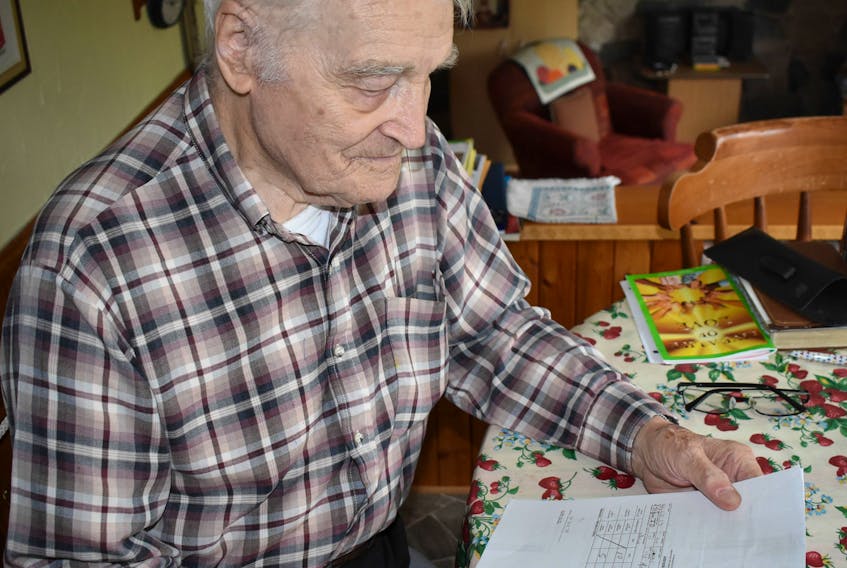SCOTSBURN, N.S.
Stan Jones couldn’t help but feel frustrated when he heard news reports that the Department of Veteran’s Affairs was covering the cost of Christopher Garnier’s PTSD treatment.
For him, it was more than the fact that Garnier never served in the military and has been suffering from the mental anguish as a result of killing off-duty Truro police officer Catherine Campbell in September 2015.
What makes it so maddening to Jones is that for years he’s been fighting to get Veteran’s Affairs to recognize the hearing loss he says he suffered from working in engine rooms on ships during his more than 20 years of service in the Royal Canadian Navy.
“That’s an insult and a slap in the face,” the 88-year-old says.
Jones lives in a home that he and his wife built in Scotsburn. He’s thankful for the blessings he has in his life, but is frustrated he can’t enjoy them to the fullest because of hearing loss.
He uses a set of hearing aids the Lions Club purchased for him, but said he would love to have a better set. With the ones he has, he can get higher decibel sounds, like a child playing or a woman talking but struggles with the lower decibels.
“I have to pay close attention in church,” he said.
For Jones, it’s clear Veterans Affairs should cover the cost of better hearing aids. He served from 1949 to 1975 with a break of one year in that period.
“I was in engine rooms all my life with screaming engines,” Jones said. “That’s why my hearing is defective.”
“There was no ear protection provided whatsoever,” he said.
Members of the military regularly had audiograms done to test for hearing damage and Jones’ records include those. Some of those records he shared with The News indicate hearing loss had started, however, one that is marked as being the final test shows his hearing is perfect. Jones is certain it’s not accurate.
Jones was first denied compensation for his hearing loss in a decision dated June 3, 2009.
“Their argument was that I had perfect hearing when I got out of the Navy,” Jones said.
He then appealed and went to an entitlement review hearing in Charlottetown about two years ago with Peter Boyles advocating on his behalf.
Boyles has worked with numerous people with disabilities over the years and has fought to get them the money he believes they’re due. When he looks at the audiograms from Jones’ time in the service he said it’s evident from the military’s own tests that there was significant hearing loss. He said the final audiogram is dated as being done when Jones was released and doesn’t match up with the earlier ones. He finds the results unbelievable.
“A baby wouldn’t have that kind of hearing,” Boyles said.
Boyles suggests the final audiogram was doctored. Some people getting discharged from the military didn’t want to have a disability on their record so would request the tester not to put down hearing loss. The person doing the test for Jones, he said for instance, could have thought he was doing Jones a favour by not marking it even if Jones didn’t ask for him to do that.
“There’s no way your hearing is going to get better,” Boyles said. “Once it’s damaged, it’s damaged.”
While Boyles is fighting to get Jones both hearing aids and disability money, he said what Jones really wants is hearing aids.
“He wants to be able to hear and he can’t hear.”
Boyles said they will be appealing again and hope that maybe this time someone will be willing to listen.
Emily Gauthier, a spokesperson with Veterans Affairs Canada said she could not comment on specific cases because of privacy and confidentiality rules.
“The care and well-being of Veterans and their families is a priority for Veterans Affairs Canada, and we are committed to ensuring Veterans have access to the services and benefits to which they are entitled,” she said.
She said to receive a disability benefit a veteran must have a diagnosed medical condition or disability and the condition or disability must be related to service.
“Each claim for disability benefits is considered on its own merit, based on the evidence,” she said.
Applicants who are dissatisfied with a decision from Veterans Affairs Canada have recourse options she said.
“Free legal help is provided by lawyers working with the Bureau of Pensions Advocates, a nationwide organization of lawyers within the Department. Those who have new evidence or can demonstrate there was an error made in the decision can have their decision reviewed by the Department.”
The arms-length tribunal Veterans Review and Appeal Board (VRAB) offers Veterans two levels of redress, she said. If a Veteran has exhausted all redress options at the Board and remains dissatisfied, they have the right to apply to the Federal Court of Canada for a judicial review of the decision.









